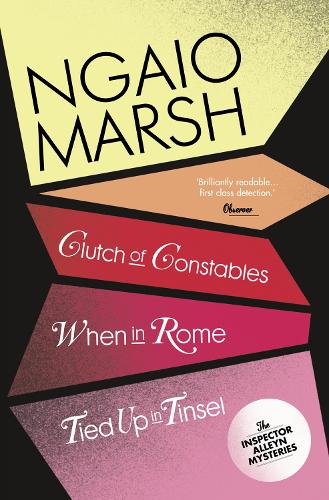
Clutch of Constables / When in Rome / Tied Up In Tinsel (The Ngaio Marsh Collection, Book 9)
(Paperback)
Publishing Details
Clutch of Constables / When in Rome / Tied Up In Tinsel (The Ngaio Marsh Collection, Book 9)
By (Author) Ngaio Marsh
Book 9
HarperCollins Publishers
HarperCollins
1st April 2010
7th January 2010
United Kingdom
Classifications
General
Fiction
823.914
Physical Properties
Paperback
672
Width 129mm, Height 198mm, Spine 43mm
470g
Description
Commemorating 75 years since the Empress of Crimes first book, the ninth volume in a set of omnibus editions presenting the complete run of 32 Inspector Alleyn mysteries.
CLUTCH OF CONSTABLES
According to Chief Superintendent Roderick Alleyn, 'the Jampot' is an international crook who regards murder as 'tiresome and regrettable necessities'. But Alleyn's wife Troy has shared close quarters with the Jampot on a pleasure cruise along the peaceful rivers of 'Constable country' and knows something is badly wrong even before the two murders on board
WHEN IN ROME
When their guide disappears mysteriously in the depths of a Roman Basilica, the members of Sebastian Mailer's tour group seem strangely unperturbed. But when a body is discovered in an Etruscan sarcophagus, Superintendent Alleyn, in Rome on the trail of an international drug racket, is very much concerned
TIED UP IN TINSEL
When a much disliked visiting servant disappears without trace after playing Santa Claus, foul play is at once suspected only suspicion falls not on the staff but on the unimpeachably respectable guests. When Superintendent Roderick Alleyn returns unexpectedly from a trip overseas, it is to find his beloved wife in the thick of an intriguing mystery
Reviews
The incomparable Ngaio Marsh.
Daily Express
Mrs Marshs work has the hallmark of the master. She is at the top of her form. Definitely first-class plus.
Queen
The finest writer in the English language of the pure, classical puzzle whodunit. Among the crime queens, Ngaio Marsh stands out as an Empress.
The Sun
Author Bio
Dame Ngaio Marsh was born in New Zealand in 1895 and died in February 1982. She wrote over 30 detective novels and many of her stories have theatrical settings, for Ngaio Marshs real passion was the theatre. She was both actress and producer and almost single-handedly revived the New Zealand publics interest in the theatre. It was for this work that the received what she called her damery in 1966.
